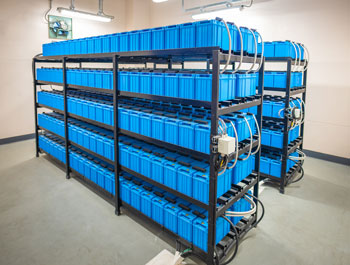Review
- Lithium-ion batteries are becoming the prevalent energy storage technology. Incidents involving BESS systems present unique challenges and risks to first responders.
- As a battery suffers abuse, the electrolyte inside will vaporize, pressurize the battery, and vent. When the separator fails, the battery will short-circuit, produce smoke, and then ignite. First responders must be able to identify the stage of battery failure and take appropriate offensive or defensive action.
- Once smoke generation occurs, the battery has failed and thermal runaway is underway. As thermal runaway occurs, you should anticipate ignition, flammable gas explosion, and propagation to other battery banks.
- You should expect a BESS incident to have a long duration, potential re-ignition, and the need for a high-volume water supply.

